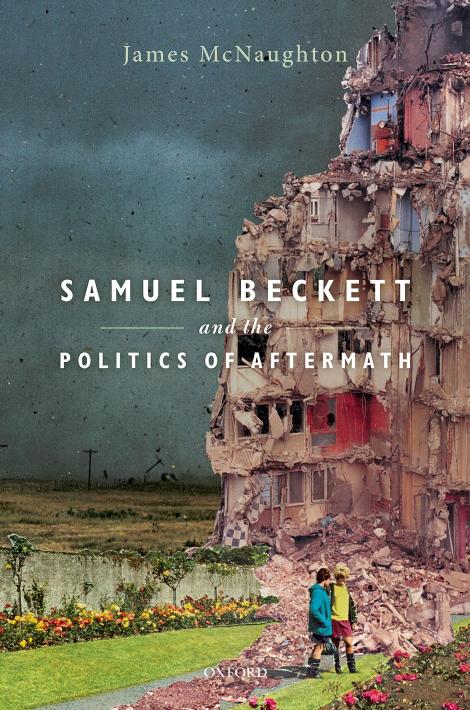Samuel Beckett and the Politics of Aftermath by James McNaughton

Author:James McNaughton
Language: eng
Format: epub, pdf
Publisher: Oxford University Press
Published: 2018-07-06T00:00:00+00:00
Heading to the Abattoir
Traditionally, interpretations of The Unnamable center on readings limited to how the book troubles language, representation, and subjectivity. The Unnamable, as already said, is written from the perspective of a narrative entity who hears voices that may be his own or may come from outside of himself. The book is broken into two parts: a thirteen page preamble, which sets up the speaker in a liminal, unpopulated purgatory, followed by a “statement,” unrelieved by paragraph breaks, for the remainder of the book. The statement separates into an account of Mahood, who is given two episodes: first, his return to his family from a “world tour,” as we’ve seen; and, second, his time in a pot. Following Mahood is an episode on Worm, a kind of protoplasmic pre-character, and finally a long crescendo of monologue in the voice of the narrator until the end. Ackerley and Gontarski nicely exemplify traditional critical interpretations that examine the paradoxes of exploring consciousness from within. When one reflects upon one’s own subject, the self becomes objectified and therefore other than oneself.
The Unnamable’s critique of being dismantles the last of Cartesian essentialism, and throws into relief the fundamental tautology of the cogito, that Descartes has already assumed what he sets out to prove when he speaks the “I” of “I think.” What self exists may be at best a nominal self or a self as a function of performance, self in narrative, in language, say, expressed by a voice from out of a hollow globe whose source can be named only as a series of “vice-existers.”42
Fiction writing is one model for understanding this split in the self in Beckett’s work. The narrator of The Unnamable, for instance, claims that characters from Beckett’s other works—Murphy, Malone, and Molloy—are ventriloquized, false versions of himself, mannequins he “foist[ed his] groans on.”43 Language models the situation too because those characters perform with language provided for them by the narrator and because the narrator himself has acquired that language from elsewhere, as he understands it, from the “vice-existers,” variously named “the master” or “Basil,” or “they”: “I have no voice and must speak … with this voice that is not mine, but can only be mine, since there is no one but me”;44 “[h]aving … no words but the words of others, I have to speak.”45 The unsluiced voice is compelled onward by a pressure, from himself and from his interrogators, to find the right word that will allow him to finally fall silent. His inability to find the right words, according to Ackerley and Gontarski, reflects in part the inability of discourse to unite a coherent subject and in part a suspicion that unifying identity in another’s language somehow entails the violence of assimilation:
That word unknown to him is the authentic “I” of being. To state the “I” completely and so merge with it in a unity, a totality (of voices, of signified and signifier), entails simultaneously the disappearance of the “I,” and so silence or nothingness.
Download
Samuel Beckett and the Politics of Aftermath by James McNaughton.pdf
This site does not store any files on its server. We only index and link to content provided by other sites. Please contact the content providers to delete copyright contents if any and email us, we'll remove relevant links or contents immediately.
| Ancient & Classical | Arthurian Romance |
| Beat Generation | Feminist |
| Gothic & Romantic | LGBT |
| Medieval | Modern |
| Modernism | Postmodernism |
| Renaissance | Shakespeare |
| Surrealism | Victorian |
4 3 2 1: A Novel by Paul Auster(12375)
The handmaid's tale by Margaret Atwood(7757)
Giovanni's Room by James Baldwin(7326)
Asking the Right Questions: A Guide to Critical Thinking by M. Neil Browne & Stuart M. Keeley(5758)
Big Magic: Creative Living Beyond Fear by Elizabeth Gilbert(5754)
Ego Is the Enemy by Ryan Holiday(5413)
The Body: A Guide for Occupants by Bill Bryson(5080)
On Writing A Memoir of the Craft by Stephen King(4935)
Ken Follett - World without end by Ken Follett(4723)
Adulting by Kelly Williams Brown(4565)
Bluets by Maggie Nelson(4547)
Eat That Frog! by Brian Tracy(4525)
Guilty Pleasures by Laurell K Hamilton(4439)
The Poetry of Pablo Neruda by Pablo Neruda(4097)
Alive: The Story of the Andes Survivors by Piers Paul Read(4018)
White Noise - A Novel by Don DeLillo(4002)
Fingerprints of the Gods by Graham Hancock(3996)
The Book of Joy by Dalai Lama(3976)
The Bookshop by Penelope Fitzgerald(3844)
